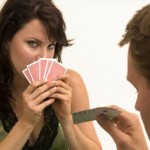 The bluff is perhaps the most famous element of poker. Only in a game like poker can you have absolutely no chance of winning, yet still pull out a victory just because you acted confident. Still, there are some rules that need to be abide by when it comes to bluffing. For one, you cannot bluff on a regular basis; if you do your opponents will recognize that you are bluffing and will be able to beat you with extremely weak hands. Obviously, the bluff, if overused, loses its entire efficacy.
The bluff is perhaps the most famous element of poker. Only in a game like poker can you have absolutely no chance of winning, yet still pull out a victory just because you acted confident. Still, there are some rules that need to be abide by when it comes to bluffing. For one, you cannot bluff on a regular basis; if you do your opponents will recognize that you are bluffing and will be able to beat you with extremely weak hands. Obviously, the bluff, if overused, loses its entire efficacy.
Another situation that you will not want to use a bluff in is when there are several people in the pot. A bluff might scare one of two people away, but if there is a large pot, the odds are that at least one of the people active in the hand will have a hand that they will not fold. A true bluff cannot beat this type of hand, and if they are not going to be folding, a bluff is simply throwing your money away.
Deception should always be an element of your game. This does not mean that it should always be at the forefront of your playing repertoire, though. A big bet will sometimes scare a weak hand away, causing you to win a hand that you otherwise would not have. The more often your opponents make mistakes, the more money you will make. This is most true when there is only one other person in the pot. It is also most effective with small pots. The bigger the pot in question, the less likely people are to fold at the end—even with weak hands. The thinking behind this is that they have already invested a lot of money into the hand, why should they fold when they have even the slightest chance of scoring big? Therefore, deception is less valuable in big pots because it will not work nearly as often as it would against a solo opponent over a small pot.
Sometimes people will bluff as a sort of false advertising. If they get “caught” bluffing in one situation, perhaps their opponents will suspect that they are bluffing during a later hand where they are actually playing a good strong hand. This is something that should be done rarely, and only against players observant enough to notice that you are not playing the hand correctly.



